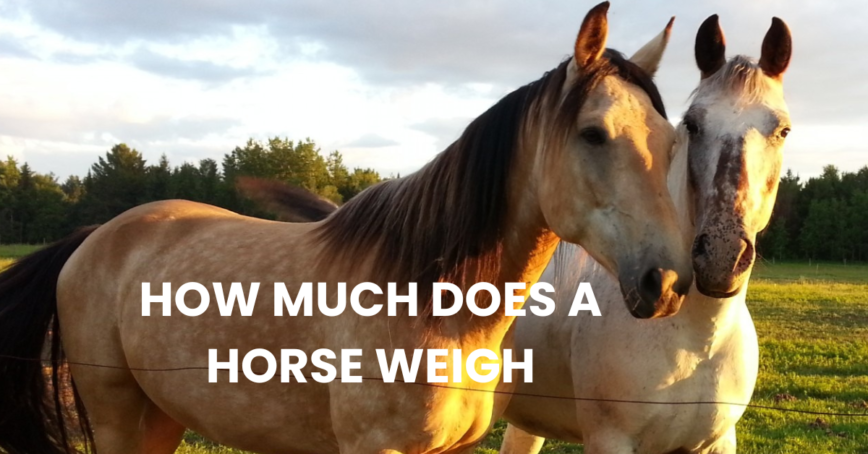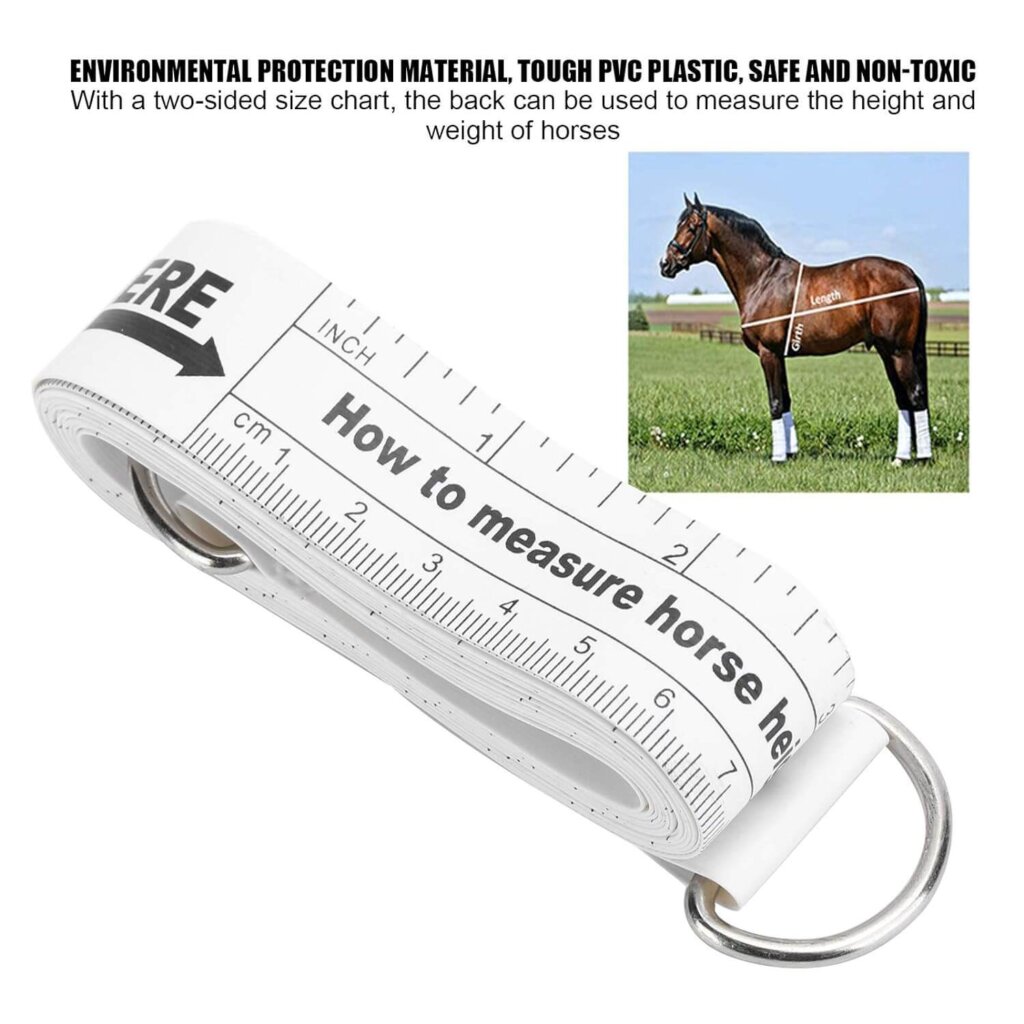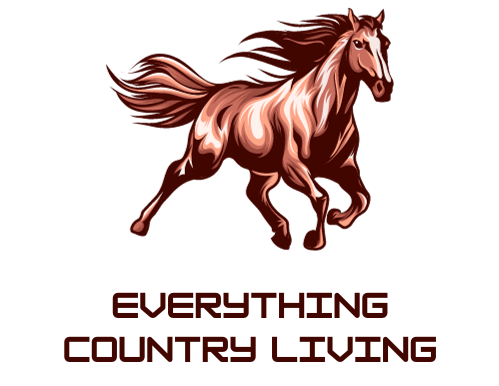

Are you curious about how much does a horse weigh? You’re not alone. Knowing a horse’s weight is vital for various reasons, whether it’s for feeding, medication dosage, or transportation. But determining a horse’s weight isn’t as straightforward as stepping on a scale. There are several methods to estimate a horse’s weight accurately, which we’ll uncover in this article.
- The Importance of Knowing a Horse’s Weight
- Factors That Affect a Horse’s Weight
- Common Methods of Weighing a Horse
- Calculating Weight using measures
- Calculations used for estimating body weight in horses
- Weighing a Horse Using a Scale or Weight Tape
- How much does a horse weigh in pounds and kilograms
- How Much Does a Horse Weigh at Birth?
- How to Maintain a Healthy Weight for Your Horse
- Resources for Accurately Weighing Your Horse
- Conclusion of how much does a horse weigh
- Other Interesting Articles:
Understanding a horse’s weight is crucial for their overall well-being. Overweight or underweight horses can suffer from various health issues, including lameness, metabolic disorders, and poor performance. By learning how to assess a horse’s weight, you can provide the appropriate care and keep them in optimal condition.
In this article, we reveal the untold secrets of how to measure a horse’s weight accurately. From using weight tapes and equations to body condition scoring and visual estimation, we’ll explore different techniques to help you determine your horse’s weight efficiently.
Let’s uncover how much a horse really weighs!
The Importance of Knowing a Horse’s Weight
Knowing a horse’s weight is more than just a number. It plays a crucial role in their health, nutrition, and overall care. By understanding a horse’s weight, you can ensure they receive the appropriate amount of food, medication, and exercise. Additionally, knowing their weight is essential for transportation purposes, as it helps determine the appropriate size of trailers and the number of horses that can safely be transported together.
Accurate weight measurement is particularly important for horses involved in competitive activities, such as racing or show jumping. An overweight or underweight horse may experience decreased performance and increased risk of injury. By maintaining a healthy weight, horses can perform at their best and avoid unnecessary strain on their bodies.
To accurately assess a horse’s weight, it’s essential to consider various factors that can affect their weight and body composition.
Factors That Affect a Horse’s Weight
Several factors can influence a horse’s weight and body condition. These include:
1. Breed and Type: Different horse breeds and types have varying average weights. For example, draft horses tend to be significantly heavier than light horse breeds.
2. Age: Horses’ weight can change significantly as they age. Young horses may have a different weight distribution compared to older horses due to growth and development.
3. Gender: Male and female horses can have different weight ranges, with males often being larger and heavier than females.
4. Height and Size: Taller horses generally weigh more than shorter ones due to their increased bone and muscle mass.
5. Body Condition: The level of fat and muscle in a horse’s body impacts their weight. Horses with higher body fat percentages will weigh more than horses with similar muscle mass but lower body fat.
6. Fitness and Exercise: Horses in regular training and exercise programs may have higher muscle mass and lower body fat, affecting their weight.
Understanding these factors is crucial when estimating a horse’s weight. Keep in mind that weight estimation methods are not as accurate as using a scale, but they can provide a good estimate for day-to-day management purposes.
Common Methods of Weighing a Horse
There are several methods available to estimate a horse’s weight accurately. These methods can be broadly categorized into two types: body measurement-based and scale/weight tape-based.
Estimating a Horse’s Weight Using Body Measurements
One commonly used method to estimate a horse’s weight is through body measurements. This method utilizes formulas based on various body measurements to calculate an approximate weight. While it may not provide the exact weight, it can give you a good estimate for management purposes.
Calculating Weight using measures
One equation that can be used is the “heart girth squared times length divided by 330” formula to get your horses weight in pounds.
Using a long measuring tape such as a quilter’s tape measure the following
Calculations used for estimating body weight in horses
| BW, kg = (Heart Girth, cm2 x length, cm) / 11,880 |
| BW, lb = (Heart Girth, in2 x length, in) / 330 |
 |
While this formulas can give you a good estimation of a horse’s weight, it’s important to note that they are not precise. Factors such as body condition, breed, and age can affect the accuracy of the estimation. For a more accurate measurement, using a scale or weight tape is recommended.
Weighing a Horse Using a Scale or Weight Tape
The most accurate way to determine a horse’s weight is by using a scale specifically designed for weighing livestock. These scales are typically found at veterinary clinics, equine hospitals, and specialized facilities. However, access to these scales may be limited, and it may not always be feasible to transport a horse to a weighing facility.
In such cases, a weight tape can be a useful tool for estimating a horse’s weight. Weight tapes are available at most equestrian supply stores and are designed to provide a rough estimate of a horse’s weight based on their girth measurement. They can also be used to measure a horses height.

To use a weight tape, place it around the horse’s girth, just behind the withers, and read the measurement indicated on the tape. The tape will usually have weight ranges corresponding to different measurements. Find the range that matches your horse’s measurement to estimate their weight.
While weight tapes can provide a convenient estimation, it’s important to note that they are not as accurate as using a scale. Variations in tape tension and body shape can affect the accuracy of the measurement. However, weight tapes can still be a useful tool for monitoring weight changes over time.
How much does a horse weigh in pounds and kilograms
Horse breeds vary significantly in size and weight, and it’s essential to have a general understanding of the average weight range for different breeds. This knowledge can serve as a starting point when estimating a horse’s weight. However, keep in mind that individual horses within a breed can still deviate from the average. Here are some examples of average weight ranges for popular horse breeds:
How Much does a Thoroughbred Weigh:
Thoroughbreds are known for their speed and athleticism. On average, an adult Thoroughbred weighs between 900 and 1,200 pounds (408-545 kg). However, it’s crucial to note that Thoroughbreds can vary significantly in size, with some individuals falling outside this range.
How Much does a Quarter Horse Weigh:
Quarter Horses are versatile and commonly used for various disciplines. The average weight of an adult Quarter Horse ranges from 950 to 1,250 pounds (430-567 kg). Again, individual horses may differ from this range based on factors such as height and build.
How Much does a Clydesdale Weigh:
Clydesdales are massive draft horses known for their strength and gentle nature. These majestic creatures can weigh between 1,700 and 2,200 pounds (771-998 kg) on average. Their substantial weight makes them well-suited for pulling heavy loads.
How Much does a Pony Weigh:
Ponies come in various sizes and breeds, each with its weight range. For example, a Shetland Pony typically weighs between 400 and 500 pounds (181-227 kg), while a Welsh Pony is about 500 pounds (227 kg). Always consider the specific pony breed when estimating weight.
How Much Does a Horse Weigh at Birth?
The weight of a foal at birth depends on the breed. There is a big difference between a pony and a Clydesdale!, but on average they weigh 100 to 150 pounds (45 to 68 kilograms) at birth
Remember, these are just a few examples, and there are numerous horse breeds worldwide, each with its weight range. Consult breed-specific resources or experts to obtain more accurate weight information for a particular breed.
How to Maintain a Healthy Weight for Your Horse
Maintaining a healthy weight for your horse is crucial for their overall well-being. Horses that are too thin or overweight can suffer from various health issues, impacting their performance and quality of life. Here are some tips to help you keep your horse at an optimal weight:
- Regular Monitoring: Regularly monitor your horse’s weight to catch any significant changes. Use a combination of estimation methods, such as weight tapes, body condition scoring, and visual assessment, to ensure accuracy.
- Balanced Diet: Provide a balanced diet tailored to your horse’s specific needs. Consult with a veterinarian or equine nutritionist to determine the appropriate amount and type of feed. Avoid overfeeding or underfeeding, as both can lead to weight-related problems.
- Exercise and Turnout: Regular exercise and turnout are essential for maintaining a healthy weight. Ensure your horse receives adequate daily exercise and access to a suitable turnout area. Exercise not only helps with weight management but also promotes overall physical and mental well-being.
- Regular Dental Care: Proper dental care is crucial for optimal digestion and nutrient absorption. Regular dental check-ups and floating (filing down sharp edges of teeth) can prevent dental issues that may affect a horse’s ability to eat and maintain weight.
- Consult Professionals: If you’re unsure about your horse’s weight or need assistance in creating a weight management plan, consult with equine professionals, such as veterinarians, nutritionists, or trainers. They can provide valuable guidance and support.
Remember, maintaining a healthy weight is an ongoing process that requires attention and adjustments as needed. Regularly assess your horse’s weight and make necessary changes to ensure their well-being.
Resources for Accurately Weighing Your Horse
Accurately weighing a horse is essential for proper care, medication dosage, transportation planning, and more. While estimating weight using visual assessment and body condition scoring can provide a rough idea, it’s beneficial to have more precise measurements. Here are some resources and methods you can use to accurately weigh your horse:
- Weight Tapes: Weight tapes are readily available tools designed specifically for estimating a horse’s weight. These tapes use measurements of the horse’s girth (around the barrel) and length to calculate weight. Follow the instructions provided with the tape to ensure accurate results.
- Livestock Scales: livestock scales are the most accurate way to determine a horse’s weight. These scales are specifically designed for large animals and can be found at some larger beef, dairy and horse farms, veterinary clinics, or research facilities. However, livestock scales may not be easily accessible for the average horse owner.
- Veterinary Assistance: Consult with your veterinarian for assistance in accurately weighing your horse. They may have access to equine scales or be able to recommend reliable resources in your area.
Conclusion of how much does a horse weigh
Understanding how much a horse weighs is an important part of responsible horse ownership. Maintaining a horses optimal weight will improve its quality of life. A weight tape makes monitoring your horses weight easy so don’t forget to get one today.
Take a look at this article on how to measure a horse in hands. It is helpful to know this information when ordering blankets or if you are selling your horse it is a common question people will ask.
If you found this article helpful please share it with others!

Other Interesting Articles:
Gypsy Vanner Horses – 17 Unbelievable Facts About this Beautiful Breed
Best Grooming Kit for Horses -Brushes to Make the Job Easy
How to Measure a Horses Height like a Pro
101 Unique Male Horse Names for Geldings and Stallions
